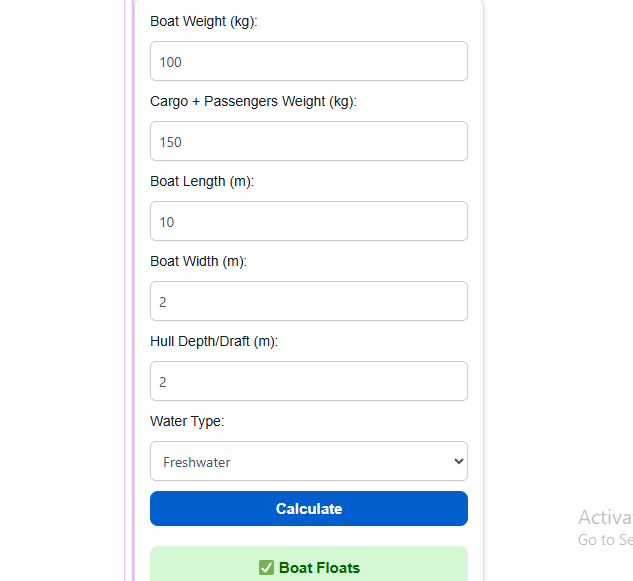Boat Floating Calculator: The Smart Way to Test Buoyancy
A boat floating calculator is the simplest way to determine whether your boat design or load setup will stay afloat. By entering dimensions, displacement, and weight, you can instantly calculate if a boat will float or sink. Many new boat owners struggle with buoyancy, and this tool removes the guesswork.
If you’re designing a DIY boat or loading cargo, using a boat floating calculator ensures safety before you hit the water. Unlike manual calculations, the calculator applies Archimedes’ principle in seconds. This makes it a must-have for beginners, engineers, and hobbyists.
To better understand buoyancy, check USGS Water Science School. For more practical tools, explore our Finance Calculator as another example of smart online calculators.
Boat Floating Calculator
Determine if your boat will float based on Archimedes’ Principle
Image Example

How to Calculate If a Boat Will Float Correctly
One of the most common questions is: how to calculate if a boat will float? The process revolves around comparing the weight of the boat and its load with the amount of water displaced. If the displaced water weighs more than the boat, it will float. Otherwise, it sinks.
A boat floating calculator simplifies this. Instead of working through formulas, you just enter your boat’s length, width, draft, and weight. The result shows whether your design is seaworthy. This is especially useful for students, DIY boat builders, or marine engineers who don’t want to rely on guesswork.
If you’re building learning projects, similar calculators like our Wronskian Calculator show how formulas are applied digitally. For more theory, you can check out this guide from ScienceDirect on Buoyancy.
Why You Should Use a Boat Floating Calculator Before Sailing
Before you take your vessel out, you should calculate if a boat will float safely with its intended load. Overloading is a major reason for accidents, and many DIY boats fail because buoyancy wasn’t calculated properly.
Using a boat floating calculator gives you confidence and safety. It ensures you don’t exceed the displacement limits and helps balance cargo evenly. Unlike manual methods, the calculator reduces human error and works within seconds.
If you want accuracy, always cross-check your results with reputable sources like BoatUS Safety Resources. For more digital tools, our Clean Time Calculator is another example of a simple but effective online solution.
Calculate If a Boat Will Float: Practical Examples
Let’s break down a simple example of how to calculate if a boat will float. Suppose your boat weighs 300 kg and displaces 0.4 cubic meters of water. Since freshwater weighs around 1000 kg per cubic meter, your boat displaces 400 kg of water. This means the boat will float, as displacement > weight.
A boat floating calculator automates this example instantly, saving time. Whether you are testing boat prototypes, student projects, or commercial vessel designs, calculators provide quick feedback.
For more detailed scientific references, see Archimedes’ Principle Explained.
❓ Frequently Asked Questions (FAQs) About the Boat Floating Calculator
1. What is a Boat Floating Calculator?
A boat floating calculator is an online tool that helps determine whether a boat will float or sink. By entering the boat’s weight, volume, and dimensions, the calculator applies Archimedes’ principle to calculate buoyancy and show if your boat will float safely.
2. How do you calculate if a boat will float?
To calculate if a boat will float, you need to compare the boat’s weight with the weight of the water it displaces. If the displaced water weighs more than the boat, it will float. A boat floating calculator does this instantly, eliminating manual formulas.
3. Why should I use a Boat Floating Calculator instead of manual calculations?
Manual calculations can be time-consuming and prone to human error. A boat floating calculator saves time, improves accuracy, and provides quick results. It’s especially useful for boat owners, students, and engineers who need fast answers.
4. Can I use the Boat Floating Calculator for any type of boat?
Yes, you can use the calculator for different boat types, including kayaks, canoes, DIY wooden boats, and even small yachts. Just enter the correct measurements and weight to get an accurate result on whether your boat will float.
5. Is the Boat Floating Calculator accurate?
Yes, the calculator is accurate when the correct input values (boat weight, volume, and load) are provided. For the best results, always measure carefully and, if possible, double-check with additional buoyancy guidelines from trusted sources like BoatUS.
You can check out our other calculators, click here to find out.